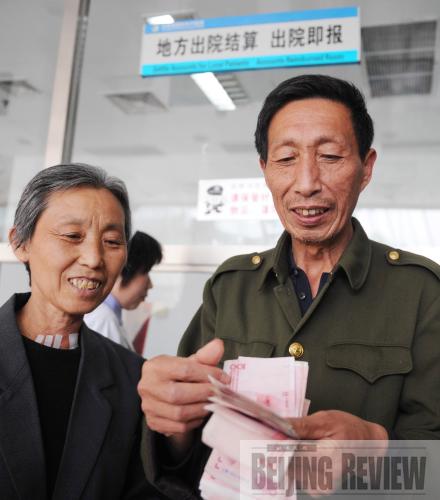|
 |
|
HEALTH BENEFITS: Farmers begin reaping the rewards of a reformed medical service in the countryside (YANG SHIYAO) |
Wage Gap Poser
According to sources with the Ministry of Labor and Social Security, in 2006 the average wage of workers in industries such as electricity, telecommunications, banking, insurance and tobacco were two to three times that of average workers in other industries. Taking into account differences in welfare benefits and other extra income, the actual gap is more likely five to 10 times greater.
Extremely high incomes in monopoly industries have become a major contributor to the growing wealth gap in China.
Simply introducing wage caps in monopoly industries cannot solve the problem. The fundamental solution lies in breaking the backs of monopoly industries. For this purpose, the government must establish anti-monopoly as a basic state policy and, on this basis, intensify efforts to dismantle various interest groups with strong vested interests and allow the whole society to share state wealth.
The Beijing News
Costs of Free Medicare
A new medical bill reimbursement program, launched on March 1 by the government of Shenmu County in northwest China's Shaanxi Province, is facing an embarrassing situation. For the last two months, hospitals in the county have been so crowded that a vacant bed is a rarity, even for those in need of emergency hospitalization. Some patients refused to leave even after doctors assured them they had fully recovered. Some critics therefore accuse the patients of abusing limited medical resources and blame it on their "low moral standards."
In reality the program is not totally free. The program stipulates that all local residents, both rural and urban, can have their medical expenses reimbursed if they spend more than 200 yuan ($29.28) in township clinics, 400 yuan ($58.57) in county-level hospitals and 3,000 yuan ($439.24) in hospitals outside the county.
It is hasty and irresponsible to call the medical reform in Shenmu a failure.
Those who waited until March to get free medical treatment are not necessarily low in morals. Market-oriented medical reform in China in the late 1990s rendered may middle- and low-income earners unable to afford to see a doctor. The marked increase in patients that has strained the medical infrastructure--resulting, for example, in insufficient hospital beds--is simply an inevitable cost of the implementation of free medical services.
Guangzhou Daily
The Art of Decency
It has been reported that a yet-to-open sex park in an upmarket area in southwest China's Chongqing Municipality was torn down on May 18 after being criticized by the public as "vulgar."
It is a victory for the media and the public that the sex park was eventually dismantled. However, this kind of solution cannot prevent a similar situation from happening again.
We need to ask why the park only attracted relevant authorities' attention after it became a media issue.
The authorities in Chongqing explained that operators of the park did not submit the construction plan for approval before work began. However, the construction of this park was a long-term process, which was being done in broad daylight. It's hard to imagine that the authorities were totally unaware of it for such a long time.
Another question to be asked is why the project's operator, who definitely would have known the procedure for submitting the construction plan, dared to start construction without approval.
Despite the "official answer" trying to justify why work had been going on in the park, the public sensed something wrong.
Behind the public victory of the demolition of the sex park in Chongqing, some systemic problems still need our attention.
Yangtze Evening News
Power Corrupts Absolutely
At a recent anti-corruption conference, Su Zhijia, Secretary of the Guangzhou Municipal Commission for Discipline Inspection of the Communist Party of China, said that government officials between 31 and 45 years old had become the group most vulnerable to corruption.
According to statistics released at the conference, between 2007 and 2008, discipline watchdogs of the Party and supervisory bodies of the government at all levels in Guangzhou investigated 637 persons in 580 corruption cases. Among them, 127 were officials aged between 31 and 45, accounting for 60 percent of all disciplined government employees.
In order to fight against corruption, categorized analyses of those officials committing acts of corruption are necessary. But the assumption that young government officials are a high-risk group is unconvincing. The root cause of corruption is not the age of officials but lax checks and balances on the power they wield.
Hence, we should pay more attention to officials with unrestricted power than officials in a specific age group. If not, we will not in essence put a stop to corruption.
Changjiang Daily | 